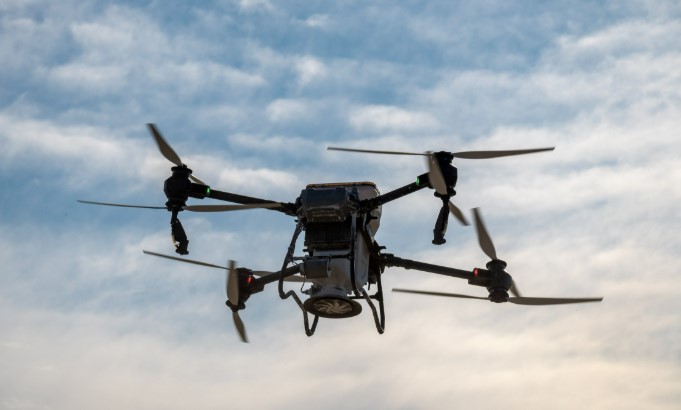A swarm of drones was spotted flying over Germany’s northern state of Schleswig-Holstein, deliberately targeting sensitive sites, including a power plant and a naval facility, in what authorities describe as suspicious drone activity. According to an internal government memo reported by media, authorities are treating the incident with high concern due to its potential implications for national security.
Unexpected Drone Activity Raises Security Concerns
The state’s interior ministry confirmed that drones were observed during the night of Friday, September 26. Officials have launched a thorough investigation to determine whether the drone activity involved espionage, sabotage, or another form of interference. Surveillance footage and eyewitness reports suggest that the drones were systematically monitoring the facilities rather than randomly flying over the area. The coordinated flight patterns indicate a level of planning and purpose, increasing concerns among security officials.
Authorities emphasized that Schleswig-Holstein, home to several critical infrastructures and NATO-related installations, is now maintaining continuous coordination with Germany’s federal government and the Bundeswehr, the national military. This coordination aims to ensure constant monitoring and heightened vigilance in response to unusual drone activity. Security teams are analyzing drone flight data to determine whether the drones collected any sensitive information.
Germany emerges as Europe’s defense powerhouse with $88 billion military budget
The interior ministry has instructed all local authorities to report any additional drone sightings immediately. Authorities have urged residents in nearby areas to remain vigilant and report unusual aerial activity. Although the drones have not posed a direct threat to civilians, officials are treating their presence near critical installations with extreme seriousness.
Regional Drone Activity and Cross-Border Incidents
The drone activity over Germany comes at a time of increasing aerial disruptions in neighboring European countries. NATO member Denmark, for instance, is investigating a wave of drone incidents at its airports. Officials in Denmark have described these events as hybrid attacks, raising concerns about cross-border interference and the potential for espionage targeting key infrastructure.
Other NATO members, including Estonia, Poland, and Romania, have recently accused foreign powers of serious interference in their airspace. Although investigators have not yet confirmed the drones’ origin, reports suggest that authorities suspect Russia due to patterns and technological capabilities consistent with previous incidents in the region. These events have prompted NATO countries to strengthen coordination in monitoring and defending sensitive sites.
📰 22,500 Turkish Citizens Flee Economic Ruin—Germany Becomes Their Lifeline
German authorities noted that while they do not yet know the precise origin of the drones, the drone activity mirrors similar incidents in Denmark and other European countries. Security analysts observe that drones increasingly survey and collect information on critical infrastructure without directly causing damage, making it difficult for authorities to detect or stop such operations.
The cross-border pattern of these drone operations has led to joint briefings between Schleswig-Holstein officials, the federal government, and military intelligence. These briefings focus on sharing information, flight patterns, and identifying potential threats before any harm can occur.
Immediate Measures and Security Response
Following the drone sightings, local authorities in Schleswig-Holstein immediately heightened security measures around key facilities. Authorities have deployed increased patrols, surveillance cameras, and monitoring systems to prevent drones or other unauthorized aerial vehicles from interfering with critical infrastructure.
Officials also continue to carefully analyze all data collected from the drones to understand the nature and purpose of the drone activity. Coordination with NATO allies has been intensified to track drones and identify any potential threats to regional security. Authorities have also been examining potential weaknesses in airspace control to prevent similar incidents from occurring in the future.
NATO conducts defense training in Portugal to test drones and unmanned systems with allies
Schleswig-Holstein’s interior ministry confirmed that communication channels with federal authorities and the military remain open at all times. This is part of a broader effort to maintain vigilance across the country, especially in areas with strategic importance for national defense and energy supply.
Security agencies are closely monitoring the power plant and naval facility targeted during the drone flights. These sites provide essential services for both civilians and military operations. Officials stated that although the drones have not caused immediate damage, they consider the drone activity a serious breach of safety and security protocols.
Across Germany, law enforcement and intelligence agencies are reviewing airspace control measures to prevent similar incidents. Experts are examining drone flight patterns, technology, and potential countermeasures to strengthen protection for critical installations.
The unusual drone activity underscores the growing use of unmanned aerial vehicles in modern surveillance and the challenges faced by nations in safeguarding sensitive infrastructure. Schleswig-Holstein, along with its federal and NATO partners, continues to monitor the situation closely, prioritizing security and rapid response to any potential threats.
